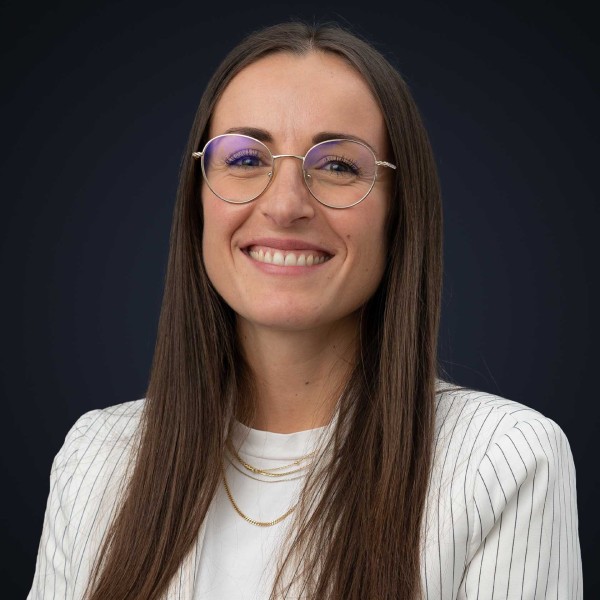Claudia Signorelli
Clinica Psiche
Via Serafino Balestra 33,
6900
Lugano,
Switzerland
Telephone number
+41764968892
Availability
Two to four weeks
Online sessions
Unavailable
E-mail address
FSP titles
Fachpsychologin für Psychotherapie FSP
Eidgenössisch anerkannte Psychotherapeutin

Specialisation
After multiple experiences, I offer psychotherapy pathways centered on the relationship and collaboration between patient and therapist
About me
After obtaining a Master’s degree in “Clinical Psychology and Psychopathology” at the University of Lausanne, I completed my clinical and training practice as an assistant psychologist at the Cantonal Psychiatric Clinic (CPC) in Mendrisio, obtaining in 2020 the cantonal authorization to practice as a licensed psychologist.
Between 2019 and 2021, I gained various professional experiences in different fields: as a support teacher within the “Progetto Casi Difficili” (Difficult Cases Project), as an educator at the Calprino foyer of the Amilcare Foundation, and as a consultant/psychologist at iQ Center by Ingrado.
From November 2021 to March 2024, I held the role of Deputy Chief Psychologist at the Monteceneri Recruitment Center, where I was responsible for assessing the psychological fitness of young Ticino candidates for military service.
Since April 2024, I have been part of the Psychological Service of the Cantonal Police, a role that currently occupies part of my professional activity. The remaining part of my professional work, from February 2022 to the present, consists of my role as a psychotherapist in training at the Clinica Psiche practice in Lugano, where I work with patients from adolescence onward, addressing various psychological and emotional difficulties.
In December 2024, I will complete the advanced training school in relational cognitive psychotherapy at the Centro Terapia Cognitiva (CTC) in Como, obtaining my psychotherapist diploma. In March 2025, I will begin a new academic specialization through the Master’s program in “Forensic Psychopathology and Clinical Criminology” at the San Raffaele University in Milan.
The relational constructivist cognitive psychotherapy approach I offer aims to guide individuals toward greater self-awareness, understanding their functioning patterns and personal resources. As the name suggests, this approach considers the relationship between patient and therapist as the central tool for helping individuals better understand their internal functioning, emotions, thoughts, and associated behaviors. Therapist and patient work together during sessions with the goal of enhancing the patient’s self-awareness.
Between 2019 and 2021, I gained various professional experiences in different fields: as a support teacher within the “Progetto Casi Difficili” (Difficult Cases Project), as an educator at the Calprino foyer of the Amilcare Foundation, and as a consultant/psychologist at iQ Center by Ingrado.
From November 2021 to March 2024, I held the role of Deputy Chief Psychologist at the Monteceneri Recruitment Center, where I was responsible for assessing the psychological fitness of young Ticino candidates for military service.
Since April 2024, I have been part of the Psychological Service of the Cantonal Police, a role that currently occupies part of my professional activity. The remaining part of my professional work, from February 2022 to the present, consists of my role as a psychotherapist in training at the Clinica Psiche practice in Lugano, where I work with patients from adolescence onward, addressing various psychological and emotional difficulties.
In December 2024, I will complete the advanced training school in relational cognitive psychotherapy at the Centro Terapia Cognitiva (CTC) in Como, obtaining my psychotherapist diploma. In March 2025, I will begin a new academic specialization through the Master’s program in “Forensic Psychopathology and Clinical Criminology” at the San Raffaele University in Milan.
The relational constructivist cognitive psychotherapy approach I offer aims to guide individuals toward greater self-awareness, understanding their functioning patterns and personal resources. As the name suggests, this approach considers the relationship between patient and therapist as the central tool for helping individuals better understand their internal functioning, emotions, thoughts, and associated behaviors. Therapist and patient work together during sessions with the goal of enhancing the patient’s self-awareness.
Information
Offer
Unemployment
Relationship problems
Family problems
Gender identity
Behavioural addictions
Behavioural problems
Support with high-level sport
Bereavement
Suicidal thoughts
Work stoppage
Divorce/separation
Sexual orientation
Loneliness
Substance addictions
Dissatisfaction with job
Stress related to learning and exams
Support in amateur sport
Stress
Existential crisis
Bullying
Palliative care
Bullying/harassment
Psychosocial risks at the workplace
Depression
Panic attacks and anxiety
Burnout
Self-esteem and self-confidence
Food-related problems
Parenting
Target groups
Teenagers
Adults
Young adults
Couples
Languages
French
Italian
English
Billing
Covered by basic insurance
To be paid by yourself

